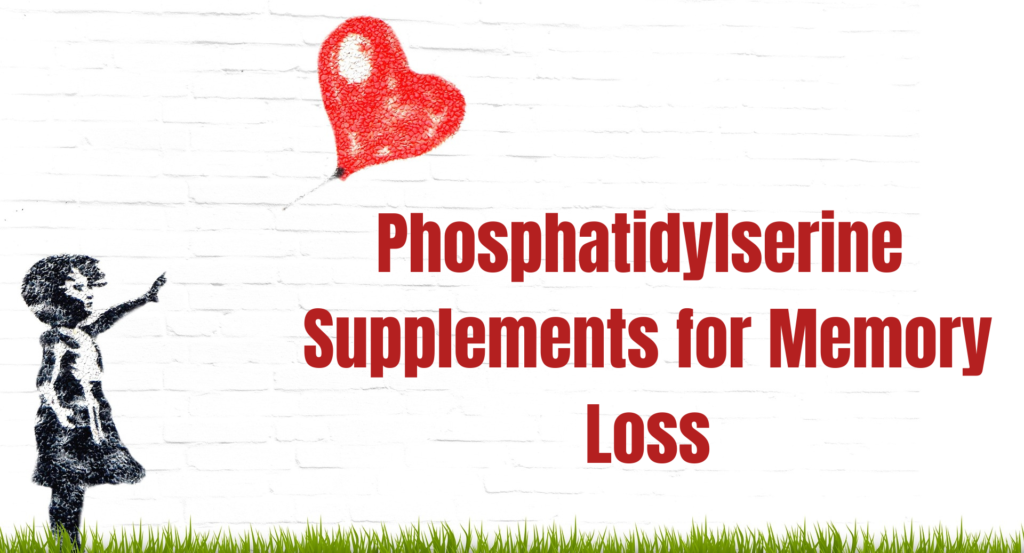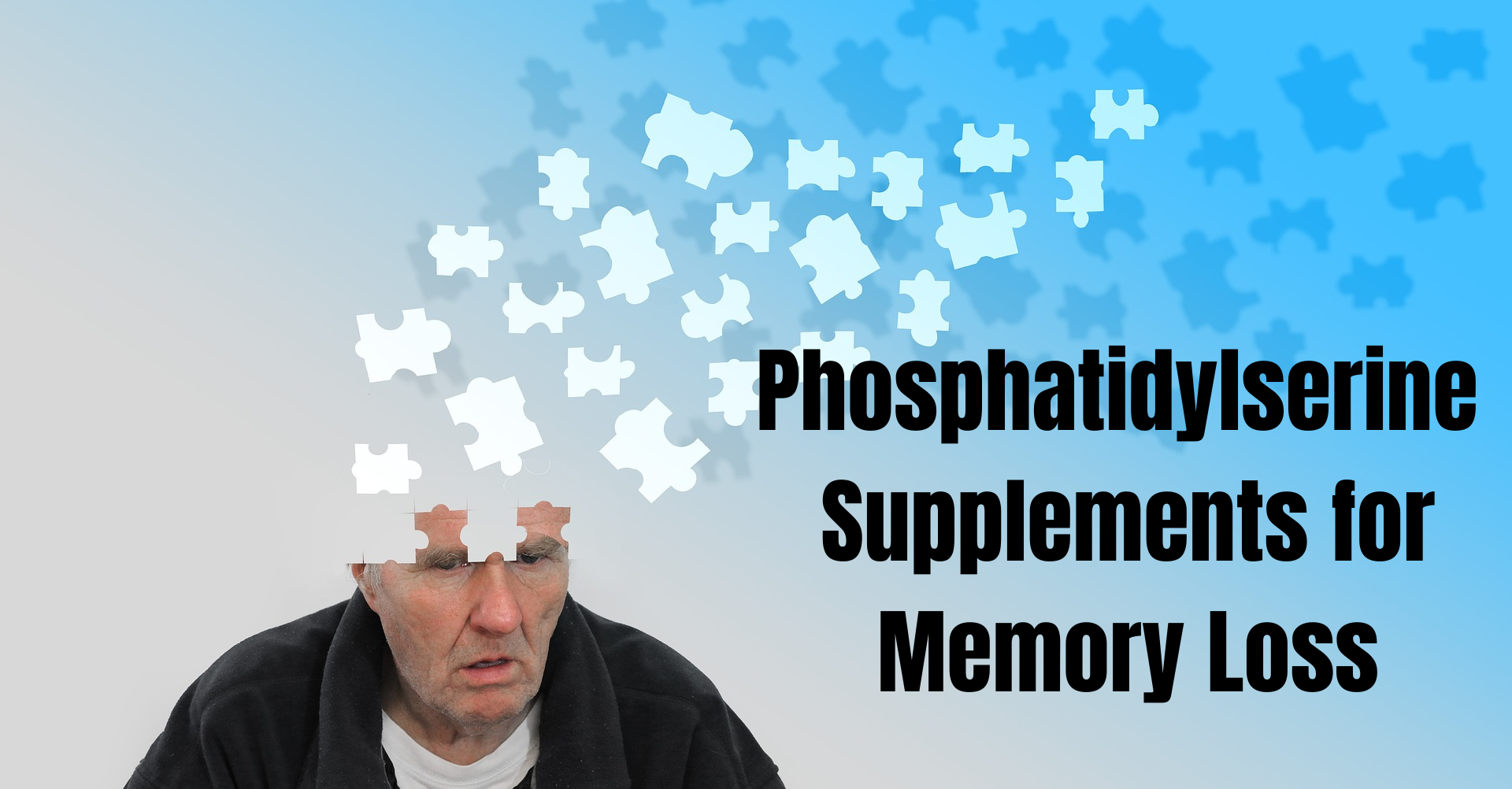Memory loss is a concern that affects millions of individuals worldwide, especially as they age. While mild forgetfulness is a normal part of the aging process, severe memory loss can be debilitating, affecting daily functioning and quality of life. Various strategies, including lifestyle changes, dietary adjustments, and cognitive exercises, are often recommended to address memory loss. Recently, attention has shifted to certain supplements, particularly phosphatidylserine, which has gained prominence as a potential aid for memory and cognitive function. In this article, we will explore the role of phosphatidylserine supplements for memory loss, diving deep into their benefits, how they work, and the scientific evidence behind them.
Table of Contents
What is Phosphatidylserine?
Phosphatidylserine is a naturally occurring phospholipid that plays a crucial role in maintaining the structure and function of cells, particularly in the brain. It is one of the primary building blocks of cell membranes and is essential for various cellular functions, including communication between cells, signaling, and the regulation of cell growth and survival.
Phosphatidylserine is particularly concentrated in the brain, where it supports neuronal cell membranes and contributes to cognitive processes such as memory, learning, attention, and mood regulation. As we age, the levels of phosphatidylserine in the brain tend to decline, which can negatively impact cognitive function. Supplementation with phosphatidylserine is believed to help counteract this decline and promote better brain health.
Here is a closer look at the different aspects of phosphatidylserine:
1. Phospholipid Structure
Phosphatidylserine is part of a larger group of molecules called phospholipids. These molecules contain a glycerol backbone, two fatty acid chains, and a phosphate group. The structure of phosphatidylserine is unique because it includes serine, an amino acid, which makes it integral to maintaining cell membrane integrity and fluidity.
- Cell Membrane Fluidity: The presence of phosphatidylserine ensures that cell membranes remain flexible and functional, allowing nutrients to pass in and out of the cells and facilitating proper communication between neurons.
2. Role in Brain Health
Phosphatidylserine is essential for proper brain function. It is involved in the maintenance of neuronal cell membranes, neurotransmitter release, and the overall health of brain cells. These processes are critical for cognitive function, memory, and mental sharpness.
- Neurotransmitter Support: Phosphatidylserine helps regulate the production of neurotransmitters, such as acetylcholine and dopamine, which play key roles in learning, memory, and mood regulation.
- Neuroplasticity: Phosphatidylserine supports synaptic plasticity, which is the brain’s ability to form and strengthen connections between neurons. This is vital for learning new information and retaining memories.
3. Age-Related Cognitive Decline
As people age, the levels of phosphatidylserine in the brain naturally decrease. This decline is associated with various age-related cognitive challenges, including memory loss, slower information processing, and difficulties with focus and concentration. Supplementing with phosphatidylserine has been shown to help alleviate some of these issues and potentially slow cognitive decline in older adults.
- Improving Memory and Focus: Phosphatidylserine supplementation has been found to improve memory, especially short-term memory and recall in elderly individuals with mild cognitive impairment.
- Preventing Cognitive Decline: Phosphatidylserine may also help delay the onset of cognitive decline associated with aging and conditions like Alzheimer’s disease.
4. Stress Response and Cortisol Regulation
In addition to its role in cognitive function, phosphatidylserine has been studied for its effects on the body’s response to stress. Research suggests that it helps regulate cortisol levels, the hormone responsible for the “fight-or-flight” response. High cortisol levels, often associated with chronic stress, can negatively affect brain function and memory.
- Cortisol Reduction: Phosphatidylserine can help reduce excess cortisol levels, promoting a calmer mood and improved mental clarity under stressful conditions.
- Mental Health Benefits: By regulating stress hormones, phosphatidylserine may help prevent stress-related memory loss and improve mood and emotional well-being.
5. Supplementation and Sources
While phosphatidylserine can be found in foods, the levels obtained from dietary sources are typically not sufficient to provide therapeutic benefits for cognitive health. For this reason, many people turn to phosphatidylserine supplements, which are often derived from soy or sunflower lecithin.
- Food Sources: Phosphatidylserine is found in foods such as soybeans, white beans, egg yolks, liver, and organ meats. However, it is difficult to obtain the amounts required for cognitive benefits through diet alone.
- Supplements: Phosphatidylserine supplements are commonly available in capsule or powder form. The typical dosage ranges from 100 mg to 300 mg per day, depending on individual needs and health goals.
6. Potential Benefits of Phosphatidylserine Supplementation
Phosphatidylserine supplements offer a variety of potential benefits for brain health, memory enhancement, and stress reduction. These benefits are particularly relevant for individuals experiencing age-related cognitive decline or those looking to boost their mental performance.
Mood Enhancement: Phosphatidylserine’s role in neurotransmitter regulation may help alleviate symptoms of depression and anxiety by promoting a balanced mood.
Memory Improvement: Phosphatidylserine has been shown to improve memory recall, particularly in older adults with memory impairments.
Focus and Attention: Supplementation with phosphatidylserine may help improve attention span, focus, and information processing speed, making it useful for individuals with attention disorders or those seeking enhanced mental clarity.
Stress Reduction: By lowering cortisol levels, phosphatidylserine helps individuals manage stress more effectively and supports overall mental well-being.
The Role of Phosphatidylserine in Brain Health
The brain is an intricate network of neurons that communicate through electrical impulses. This communication is vital for processing thoughts, forming memories, and performing everyday tasks. Phosphatidylserine helps support this communication by maintaining the fluidity and permeability of cell membranes. These membranes are crucial for the proper functioning of neurotransmitters like acetylcholine, which are involved in memory and learning.
In addition, phosphatidylserine aids in the maintenance of the brain’s synaptic plasticity – the ability of the brain to adapt and reorganize neural pathways in response to new information. This adaptability is a crucial component of memory formation and retrieval, making phosphatidylserine an important factor in overall brain health.
How Phosphatidylserine Supplements Help Memory Loss
As people age, they often experience a natural decline in phosphatidylserine levels, which can lead to reduced cognitive function and memory loss. Phosphatidylserine supplements have been suggested as a way to counteract this decline and improve brain health. Several studies have investigated the effects of phosphatidylserine supplementation on memory and cognitive function, with some showing promising results.
1. Supporting Neurotransmitter Function
One of the main ways that phosphatidylserine supplements help combat memory loss is by supporting the function of neurotransmitters. Neurotransmitters are chemicals that allow neurons to communicate with each other. Acetylcholine, for example, is a neurotransmitter that plays a vital role in memory formation. By helping maintain the health and fluidity of brain cell membranes, phosphatidylserine ensures that neurotransmitters can effectively send signals between neurons, thus supporting cognitive function.
2. Reducing Cortisol Levels
Chronic stress and elevated cortisol levels have been shown to negatively impact memory and cognitive function. Phosphatidylserine has been found to reduce cortisol levels in the body, thereby mitigating the negative effects of stress on the brain. Studies suggest that supplementing with phosphatidylserine can help protect against stress-induced memory loss and improve overall cognitive function, especially in high-stress individuals.
3. Boosting Synaptic Plasticity
Synaptic plasticity is the brain’s ability to change and adapt in response to learning and memory formation. Phosphatidylserine supplements can boost synaptic plasticity by supporting the integrity of brain cell membranes. This enhanced plasticity may lead to improved memory retention and recall, making phosphatidylserine supplements particularly beneficial for individuals experiencing age-related memory decline.
4. Protecting Against Cognitive Decline
Several studies have demonstrated that phosphatidylserine supplements can help slow the progression of cognitive decline in older adults. One notable study published in the journal Aging Clinical and Experimental Research found that individuals who took phosphatidylserine supplements for 12 weeks experienced significant improvements in memory, learning, and concentration compared to a placebo group. The researchers concluded that phosphatidylserine may have a protective effect against age-related cognitive decline.
Scientific Evidence Supporting Phosphatidylserine for Memory Loss
A number of clinical trials have explored the potential of phosphatidylserine as a treatment for memory loss and cognitive decline. Below, we summarize some of the key findings from these studies:
1. Phosphatidylserine and Alzheimer’s Disease
Alzheimer’s disease is a progressive neurodegenerative disorder that is characterized by severe memory loss and cognitive decline. While there is currently no cure for Alzheimer’s disease, certain treatments aim to slow its progression. Phosphatidylserine has been investigated as a potential adjunct therapy for Alzheimer’s patients, with some studies indicating that it may help improve memory and cognitive function in the early stages of the disease.
A study published in Psychopharmacology found that Alzheimer’s patients who took phosphatidylserine supplements showed significant improvements in short-term memory and mood compared to those who took a placebo. Although the benefits were modest and mainly observed in the early stages of the disease, these findings suggest that phosphatidylserine may offer some protective effects against cognitive decline.
2. Phosphatidylserine and Age-Related Cognitive Decline
Age-related cognitive decline is a common concern among older adults, even in the absence of neurodegenerative diseases like Alzheimer’s. Several studies have examined the effects of phosphatidylserine supplementation in this population, with positive results.
In one study published in the Journal of Clinical Biochemistry and Nutrition, researchers found that elderly individuals with mild cognitive impairment who took phosphatidylserine supplements for six months showed improvements in memory and attention. The study concluded that phosphatidylserine may be a useful intervention for age-related cognitive decline.
3. Phosphatidylserine and Athletic Performance
Interestingly, phosphatidylserine supplements have also been studied in athletes, particularly for their ability to enhance cognitive function and reduce stress. Athletes often face physical and mental stress during intense training sessions, and phosphatidylserine has been shown to improve mental clarity and reduce cortisol levels in these individuals.
A study published in Medicine & Science in Sports & Exercise found that athletes who took phosphatidylserine supplements experienced improved cognitive performance, including better focus and reaction times, during physical activities. This suggests that phosphatidylserine may not only benefit older adults but also individuals looking to improve their cognitive function during high-stress situations.
Dosage and Safety of Phosphatidylserine Supplements
Phosphatidylserine supplements are generally considered safe for most individuals when taken at the recommended dosage. The typical dosage for memory support and cognitive function is around 100 to 300 mg per day, with some studies using higher doses for specific conditions like Alzheimer’s disease.
It is important to note that phosphatidylserine supplements are derived from either bovine (cow) brain tissue or plant sources, such as soy or sunflower lecithin. Due to concerns about the transmission of diseases like mad cow disease, most modern supplements are made from plant-based sources. These plant-derived phosphatidylserine supplements are considered safe and free from animal-based risks.
Possible Side Effects
While phosphatidylserine supplements are generally well-tolerated, some individuals may experience mild side effects, such as digestive discomfort, nausea, or insomnia. These side effects are typically rare and can often be avoided by taking the supplement with food or reducing the dosage.
As with any supplement, it is important to consult a healthcare professional before starting phosphatidylserine, especially for individuals who are pregnant, nursing, or taking other medications.

Combining Phosphatidylserine with Other Supplement.
Phosphatidylserine is often used alongside other supplements to maximize its cognitive-enhancing benefits. The combination of these supplements can work synergistically, offering additional support for brain health, memory improvement, and overall mental clarity. Below are some of the most popular supplements that are commonly combined with phosphatidylserine:
1. Omega-3 Fatty Acids
Omega-3 fatty acids, particularly docosahexaenoic acid (DHA), are crucial for brain development and function. DHA, which is found in fish oils, is a key structural component of brain cells and is known to play a role in reducing inflammation and supporting cognitive function. When combined with phosphatidylserine, omega-3 fatty acids can help improve memory, attention, and overall brain health.
- Why Combine Omega-3 with Phosphatidylserine?
- Omega-3 fatty acids help support the structural integrity of brain cell membranes, complementing the action of phosphatidylserine.
- The anti-inflammatory properties of omega-3s may help reduce brain inflammation, which is linked to cognitive decline and memory problems.
2. Ginkgo Biloba
Ginkgo biloba is one of the most well-known herbal supplements for cognitive enhancement. It has been used for centuries in traditional medicine to improve blood circulation, particularly in the brain. By increasing blood flow, ginkgo biloba can potentially enhance mental clarity and memory retention.
- Why Combine Ginkgo Biloba with Phosphatidylserine?
- Improved blood flow to the brain can enhance the delivery of oxygen and nutrients, which supports the effectiveness of phosphatidylserine in promoting memory and cognitive function.
- Ginkgo biloba’s antioxidant properties can help protect brain cells from oxidative stress, further supporting brain health.
3. Acetyl-L-Carnitine (ALCAR)
Acetyl-L-carnitine is an amino acid derivative that helps with energy production in the brain. It plays a role in the synthesis of acetylcholine, a neurotransmitter essential for memory and learning. Acetyl-L-carnitine is often used to improve cognitive function and combat age-related memory decline.
- Why Combine Acetyl-L-Carnitine with Phosphatidylserine?
- Both phosphatidylserine and acetyl-L-carnitine support neurotransmitter activity, which can enhance memory retention and cognitive performance.
- Acetyl-L-carnitine’s role in energy metabolism may boost mental energy, making it a good complement to phosphatidylserine’s brain-supporting properties.
4. Nootropic Blends
Many nootropic supplements—sometimes called “smart drugs”—combine various ingredients to enhance cognitive function, memory, and mental performance. These blends often include compounds like caffeine, L-theanine, and racetams, which work together to support focus and learning.
- Why Combine Phosphatidylserine with Nootropics?
- Phosphatidylserine can serve as a foundational supplement in a nootropic stack by improving the health of brain cell membranes and supporting neurotransmitter function.
- Nootropic blends with phosphatidylserine may provide enhanced cognitive benefits, particularly for memory, learning, and focus.
5. Curcumin
Curcumin, the active compound found in turmeric, has strong anti-inflammatory and antioxidant properties. It has been studied for its potential benefits in reducing the risk of neurodegenerative diseases and improving cognitive function. Curcumin’s ability to cross the blood-brain barrier makes it particularly effective in protecting brain cells from damage.
- Why Combine Curcumin with Phosphatidylserine?
- Curcumin can help reduce brain inflammation and oxidative stress, which are factors that contribute to memory loss and cognitive decline.
- Combining curcumin with phosphatidylserine may offer a protective effect against age-related cognitive decline and support long-term brain health.
6. Bacopa Monnieri
Bacopa monnieri is an herbal supplement traditionally used in Ayurvedic medicine to enhance memory, learning, and concentration. Studies suggest that Bacopa may help improve cognitive performance by promoting new neuron growth and protecting brain cells from oxidative damage.
- Why Combine Bacopa Monnieri with Phosphatidylserine?
- Bacopa’s neuroprotective properties may enhance the memory-boosting effects of phosphatidylserine, making the combination a powerful tool for cognitive enhancement.
- Both supplements support synaptic plasticity, helping the brain form and retrieve memories more effectively.
7. Choline
Choline is an essential nutrient that plays a critical role in brain health, particularly in the production of acetylcholine, a neurotransmitter involved in memory and learning. Choline is found in foods like eggs and liver, but it can also be taken as a supplement for enhanced cognitive function.
- Why Combine Choline with Phosphatidylserine?
- Choline supports the production of acetylcholine, which works in tandem with phosphatidylserine’s role in supporting cell membrane integrity and neurotransmitter activity.
- Together, choline and phosphatidylserine may enhance learning, memory, and mental clarity.
8. Vitamin B Complex
B vitamins, particularly B6, B9 (folate), and B12, are essential for brain health and cognitive function. They are involved in the production of neurotransmitters and the maintenance of the nervous system. Deficiencies in B vitamins have been linked to cognitive decline and memory problems.
- Why Combine B Vitamins with Phosphatidylserine?
- B vitamins help maintain healthy nerve function, which can complement phosphatidylserine’s effects on brain cell membranes and neurotransmitter communication.
- A vitamin B complex can help reduce levels of homocysteine, an amino acid linked to cognitive decline, further supporting brain health.
9. Coenzyme Q10 (CoQ10)
CoQ10 is an antioxidant that helps protect cells from damage and plays a role in energy production within cells. It is particularly important for brain health, as the brain is highly metabolically active and requires a steady supply of energy to function optimally.
- Why Combine CoQ10 with Phosphatidylserine?
- CoQ10’s role in energy production can complement phosphatidylserine’s brain-supporting properties by ensuring that brain cells have the energy they need to function efficiently.
- The antioxidant properties of CoQ10 may help protect brain cells from oxidative stress, further supporting cognitive function.
10. Ashwagandha
Ashwagandha is an adaptogenic herb that helps the body manage stress. It has been studied for its potential benefits in reducing cortisol levels, improving memory, and enhancing cognitive function.
- Why Combine Ashwagandha with Phosphatidylserine?
- Both ashwagandha and phosphatidylserine have been shown to reduce cortisol levels, which can help protect the brain from stress-induced memory loss.
- Ashwagandha’s ability to support mental clarity and focus makes it a complementary addition to phosphatidylserine for cognitive enhancement.
Conclusion: Is Phosphatidylserine the Right Supplement for You?
Phosphatidylserine supplements for memory loss have shown promise in both scientific studies and anecdotal reports. With their ability to support neurotransmitter function, reduce cortisol levels, and enhance synaptic plasticity, phosphatidylserine supplements may be a valuable tool for individuals looking to preserve cognitive function as they age.
While phosphatidylserine is not a cure for memory loss or cognitive decline, it can serve as part of a holistic approach to brain health that includes a healthy diet, regular exercise, and mental stimulation. If you’re experiencing memory problems or simply want to support your cognitive function, phosphatidylserine supplements may be worth considering. As always, consult with a healthcare professional to determine if this supplement is right for your individual needs.

